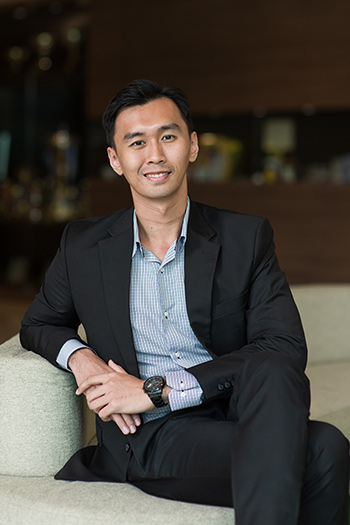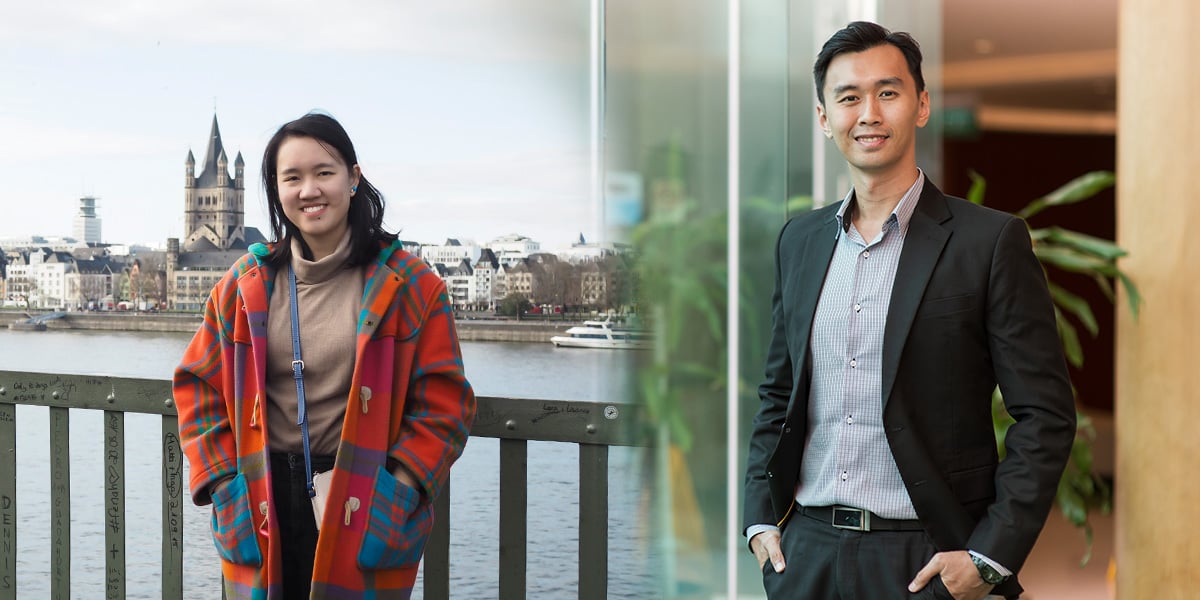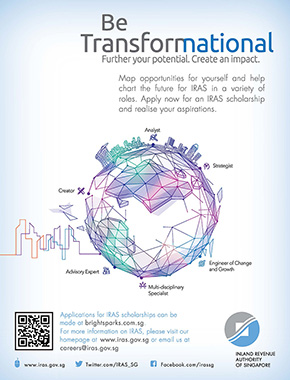Taxes are a necessary part of a nation's economy. To help deepen the partnership with the community in the digital age, staff at Inland Revenue Authority of Singapore (IRAS) must be willing to embrace new technologies that help to improve the tax experience. Thomas Chua, 28, a Senior Tax Officer at the Corporate Tax Services branch, and Nio Jing Rong, 22, an undergraduate who interned at the International Tax and Relations Division, tell us about the dynamic opportunities that challenge them to keep learning in order to serve the community better.
What was your motivation to apply for the scholarship with IRAS?
Thomas: I was very keen to join the public sector because I wanted to serve and have a meaningful job. The second thing that made me decide on IRAS is that I was looking for an organisation that would invest and grow her people. I asked around, and after several rounds of interviews, I felt that IRAS is the One.

Thomas Chua Peng Kuang
IRAS Merit Undergraduate Scholarship
Senior Tax Officer
Bachelor of Business Administration
– National University of Singapore
Jing Rong: I always wanted to pursue a career in the public sector as I felt that I would be making a meaningful contribution to society. The choice to apply for IRAS came about after studying economics in junior college, which sparked my interest in tax policies and the implications they have on the country's economy. Furthermore, I also heard many positive things about IRAS' working environment.
What types of work have you experienced at IRAS?
Thomas: When I was first with the Individual Income Tax Division, my work was largely in tax assessments and queries. I underwent formal courses on the Income Tax Act in order to carry out my work competently. In my current role at the Corporate Tax Division, I acquire skills and experience when it comes to explaining and breaking down tax information into bite-size details to help taxpayers understand their obligations.
Jing Rong: From my internship, I experienced first-hand the impact a tax officer could make. Every day, I would be presented a different case to work on and I enjoyed the process of understanding, researching, and concluding each of them. Having to deal with cases regarding taxpayers from various countries has also equipped me with a better understanding of the different tax frameworks around the world. The work environment also made me feel like I was part of a big family, especially when I participated in non-work-related team activities such as badminton and volleyball.
Jing Rong, what was the most challenging part of your internship, and how will your experience prepare you for the future?
Jing Rong: It was tough trying to absorb all the new information and familiarise myself with the technical terms related to international tax when I first started. In addition, I was the only intern in the department which was quite intimidating initially. However, my colleagues were patient and friendly, which helped ease me into the work.
Now that I've gotten a flavour of what working in IRAS is like, I feel more prepared to embark on my career with IRAS after my graduation

Jing Rong's scholarship experience includes soaking in different cultures and trying to understand tax frameworks from around the world.
Nio Jing Rong
IRAS Merit Undergraduate Scholarship
Undergraduate
Bachelor of Business Administration (Accountancy)
– National University of Singapore
What are the development opportunities you've had at IRAS, Thomas?
Thomas: IRAS invests in developing her people – by sending staff for tax-related as well as leadership courses, amongst others. The organisation has provided me with a lot of opportunities to keep up to date with technology as well. I've even attended workshops on Augmented Reality and Virtual Reality. We are trying to digitise the whole experience for taxpayers, so we're always looking for ways to further improve our work functions.
Thomas, what are some of the technologies employed to achieve a future-ready Singapore?
Thomas: We're moving towards more digitalisation because we recognise that people are using their smartphones for most things now. When I was with the Individual Income Tax Division, there were many initiatives aimed at enabling tax filing on the mobile phone. To reach out to the social media savvy public, we push out infographics on Facebook to educate the community on key messages and how they are contributing to nation building.
Besides improving taxpayer experience, we're constantly thinking of ways to do our work more efficiently. For example, IRAS deploys Robotic Process Automation (RPA) which helps to automate and cut down on the manual effort needed in some of our day-to-day processes. We are also exploring artificial intelligence, and how we can tap on this technology to further improve our processes. The management in IRAS is very willing to push forward for digitalisation.
What do you hope to achieve in your job at IRAS in the future, Jing Rong?
Jing Rong: Joining IRAS will fuel the passion I currently feel towards tax work. I would feel accomplished when my work allows me to reach the goal of contributing to the general population, and make a positive impact, regardless big or small, towards Singapore's tax administration.

